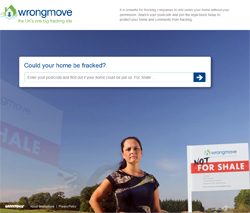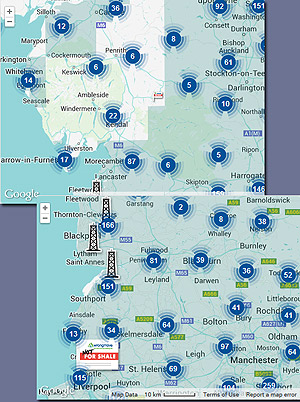Greenpeace has launched a legal challenge to fracking in England, in a move it says could halt “reckless and presumptuous” plans for shale gas extraction across the country.
It made the announcement at a joint press conference in Lancashire with people whose homes are in the firing line of potential fracking sites, including people from Balcombe.
Greenpeace expects thousands of people to join the legal block, creating a patchwork of "no-go" areas for the fracking industry across the country.
A special website has been set up called Wrong Move ( www.wrongmove.org ) which will tell you whether or not your area is a possible area for Fracking to take place. Simply put in your post code and it will show you where in your area the risk is. This is especially important if you are thinking of selling your home, now or in the near future.
You will also be given the option to join the mass legal block.
 A quick look at the map below right, shows that the North West is particularly identified as an area with favourable sites where exploratory drilling may well take place.
A quick look at the map below right, shows that the North West is particularly identified as an area with favourable sites where exploratory drilling may well take place.
Readers will remember that a small earth quake was the result of exploratory drilling by Cuadrilla just outside of Blackpool.
Eve McNamara, resident near the Banks site in Lancashire where Cuadrilla plans to drill:
“I’m joining the legal block because fracking will be an absolute disaster for Lancashire. I’ve tried every other method, but the Government and Cuadrilla are just ploughing ahead. I hope sense will prevail and the industry will leave, so the North West can concentrate on renewable energy.”
Andrew Pemberton, Lancashire dairy farmer:
“I’m supplying milk to 3,000 households, and if for any reason my water became contaminated, my business would be ruined and my livelihood destroyed, as well as the livelihoods of the 16 families who work for me. Fracking is dangerous and short-sighted. We should be keeping this gas in the ground.”
Karen Ditchfield is a company director and resident near the Singleton site in Lancashire.
“My husband and I are joining the legal block because we’re worried and frustrated about what’s going on. No one has asked us if they can drill under our home and land. But this is not just about my life, it is my children’s lives, and what we’re leaving for people for years to come. More effort should be put into safer and longer-term energy sources.”
The legal case is based on fracking companies’ plans to drill horizontally under people’s homes; something Greenpeace says would be unlawful if they do not have permission.
“Under English law, if you own land, your rights extend to all the ground beneath it. That means if someone drills under your home without permission it is trespass,” said Greenpeace Senior Campaigner Anna Jones. (1)
“To avoid being liable for trespass, drillers would need landowners’ permission. And this case is about people explicitly declaring they do not give that permission. This will make it extremely difficult for companies to move ahead with any horizontal drilling plans.”
 Lawyer and Harrison Grant partner Kate Harrison:
Lawyer and Harrison Grant partner Kate Harrison:
“The common law on this is clear. If fracking companies don't seek and receive permission for drilling under people's homes they will be liable for trespass. Cuadrilla and other companies would do well to respect people’s rights and not push on with drilling plans where they’re not wanted.”
The industry is understood to have asked the Government to introduce legislation that would over-ride this requirement and remove landowners’ rights (2), but this would be hugely controversial and take time.
Anyone living in an area that the government is considering for oil and gas drilling and possible fracking can join the block. The government is currently consulting on the 14th onshore licensing round for oil and gas – and next year could put over two thirds of the country up for license for oil and gas exploration and possible fracking (3).
Marcus Adams, who lives within 200 yards of a proposed Celtique drilling site in Fernhurst West Sussex, said:
“it is vitally important that our rights to decide what happens to our property is upheld. I am deeply concerned that this Government, in its drive to promote unconventional oil and gas extraction, wants to take away existing rights and push through changes that are solely designed to benefit the fracking industry.”
Greenpeace’s Anna Jones said fracking was a desperate ploy by the Conservative-led Government to keep the UK hooked on fossil fuels, at a time when we should be moving towards cleaner, safer energy sources.
“Fracking is risky for local environments, risky for our water supplies and risky for the global climate. People are right to stand up and say ‘not under my land you don’t.”
(1) The Supreme Court held in 2010 in Bocardo SA v Star Energy [2010] UKSC 35; [2011] 1 AC 380 that these rights apply when someone wants to drill underneath your land.
(2) http://www.thetimes.co.uk/tto/business/industries/naturalresources/article3877163.ece
(3) http://www.greenpeace.org.uk/newsdesk/energy/data/infographic-fracking-backyard
Source: Greenpeace / Unionsafety



 Lawyer and Harrison Grant partner Kate Harrison:
Lawyer and Harrison Grant partner Kate Harrison: